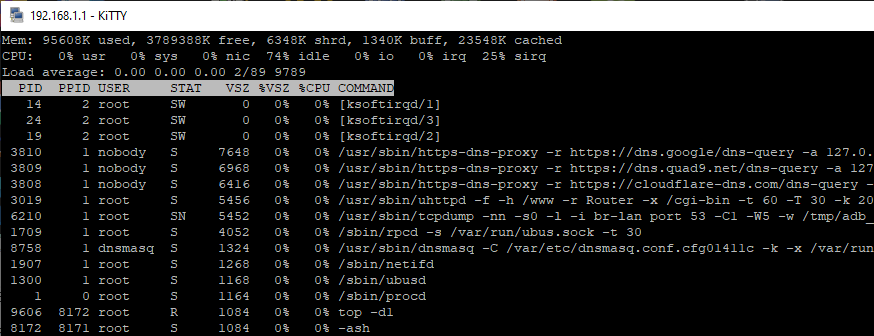I almost pooped myself when I saw all the replies here. Too much technical words that I barely understood the meaning of but I still gotta try so if any of what I did is incorrect please correct me with steps so I can just follow them sequentially. Also, it's my first try using ssh or putty(I used putty) and my first time posting so I'm still not familiar with formats but I really appreciate your help.
(1) When SQM is disabled
(2)
root@GL-B1300:~# cat /etc/config/sqm
config queue
option debug_logging '0'
option verbosity '5'
option linklayer 'none'
option interface 'eth0'
option qdisc_advanced '0'
option download '680000'
option upload '15300'
option enabled '1'
option qdisc 'cake'
option script 'piece_of_cake.qos'
(3)
root@GL-B1300:~# ifstatus wan
{
"up": true,
"pending": false,
"available": true,
"autostart": true,
"dynamic": false,
"uptime": 421647,
"l3_device": "eth0",
"proto": "dhcp",
"device": "eth0",
"metric": 10,
"delegation": true,
"ipv4-address": [
{
"address": "71.202.247.142",
"mask": 22
}
],
"ipv6-address": [
],
"ipv6-prefix": [
],
"ipv6-prefix-assignment": [
],
"route": [
{
"target": "71.202.244.1",
"mask": 32,
"nexthop": "0.0.0.0",
"source": "71.202.247.142\/32"
},
{
"target": "0.0.0.0",
"mask": 0,
"nexthop": "71.202.244.1",
"source": "71.202.247.142\/32"
}
],
"dns-server": [
"75.75.75.75",
"75.75.76.76"
],
"dns-search": [
"hsd1.ca.comcast.net."
],
"inactive": {
"ipv4-address": [
],
"ipv6-address": [
],
"route": [
],
"dns-server": [
],
"dns-search": [
]
},
"data": {
"hostname": "GL-B1300-ec0-5G",
"leasetime": 345600
}
}
(4)
root@GL-B1300:~# tc -s qdisc
qdisc noqueue 0: dev lo root refcnt 2
Sent 0 bytes 0 pkt (dropped 0, overlimits 0 requeues 0)
backlog 0b 0p requeues 0
qdisc mq 0: dev eth0 root
Sent 78014535 bytes 250712 pkt (dropped 0, overlimits 0 requeues 0)
backlog 0b 0p requeues 0
qdisc fq_codel 0: dev eth0 parent :1 limit 1024p flows 1024 quantum 1514 target 5.0ms interval 100.0ms ecn
Sent 15944372 bytes 49355 pkt (dropped 0, overlimits 0 requeues 0)
backlog 0b 0p requeues 0
maxpacket 0 drop_overlimit 0 new_flow_count 0 ecn_mark 0
new_flows_len 0 old_flows_len 0
qdisc fq_codel 0: dev eth0 parent :2 limit 1024p flows 1024 quantum 1514 target 5.0ms interval 100.0ms ecn
Sent 26413825 bytes 74387 pkt (dropped 0, overlimits 0 requeues 0)
backlog 0b 0p requeues 0
maxpacket 0 drop_overlimit 0 new_flow_count 0 ecn_mark 0
new_flows_len 0 old_flows_len 0
qdisc fq_codel 0: dev eth0 parent :3 limit 1024p flows 1024 quantum 1514 target 5.0ms interval 100.0ms ecn
Sent 15384078 bytes 58800 pkt (dropped 0, overlimits 0 requeues 0)
backlog 0b 0p requeues 0
maxpacket 0 drop_overlimit 0 new_flow_count 0 ecn_mark 0
new_flows_len 0 old_flows_len 0
qdisc fq_codel 0: dev eth0 parent :4 limit 1024p flows 1024 quantum 1514 target 5.0ms interval 100.0ms ecn
Sent 20272260 bytes 68170 pkt (dropped 0, overlimits 0 requeues 0)
backlog 0b 0p requeues 0
maxpacket 0 drop_overlimit 0 new_flow_count 0 ecn_mark 0
new_flows_len 0 old_flows_len 0
qdisc ingress ffff: dev eth0 parent ffff:fff1 ----------------
Sent 1158015020 bytes 841771 pkt (dropped 0, overlimits 0 requeues 0)
backlog 0b 0p requeues 0
qdisc mq 0: dev eth1 root
Sent 152431535417 bytes 117599100 pkt (dropped 0, overlimits 0 requeues 215)
backlog 0b 0p requeues 215
qdisc fq_codel 0: dev eth1 parent :1 limit 1024p flows 1024 quantum 1514 target 5.0ms interval 100.0ms ecn
Sent 29711201698 bytes 23256980 pkt (dropped 0, overlimits 0 requeues 34)
backlog 0b 0p requeues 34
maxpacket 67770 drop_overlimit 0 new_flow_count 52 ecn_mark 0
new_flows_len 0 old_flows_len 0
qdisc fq_codel 0: dev eth1 parent :2 limit 1024p flows 1024 quantum 1514 target 5.0ms interval 100.0ms ecn
Sent 46178479780 bytes 35165103 pkt (dropped 0, overlimits 0 requeues 64)
backlog 0b 0p requeues 64
maxpacket 66616 drop_overlimit 0 new_flow_count 59 ecn_mark 0
new_flows_len 0 old_flows_len 0
qdisc fq_codel 0: dev eth1 parent :3 limit 1024p flows 1024 quantum 1514 target 5.0ms interval 100.0ms ecn
Sent 40416169414 bytes 30941861 pkt (dropped 0, overlimits 0 requeues 52)
backlog 0b 0p requeues 52
maxpacket 67770 drop_overlimit 0 new_flow_count 158 ecn_mark 0
new_flows_len 0 old_flows_len 0
qdisc fq_codel 0: dev eth1 parent :4 limit 1024p flows 1024 quantum 1514 target 5.0ms interval 100.0ms ecn
Sent 36125684525 bytes 28235156 pkt (dropped 0, overlimits 0 requeues 65)
backlog 0b 0p requeues 65
maxpacket 67770 drop_overlimit 0 new_flow_count 111 ecn_mark 0
new_flows_len 0 old_flows_len 0
qdisc fq_codel 0: dev wifi0 root refcnt 2 limit 1024p flows 1024 quantum 1514 target 5.0ms interval 100.0ms ecn
Sent 0 bytes 0 pkt (dropped 0, overlimits 0 requeues 0)
backlog 0b 0p requeues 0
maxpacket 0 drop_overlimit 0 new_flow_count 0 ecn_mark 0
new_flows_len 0 old_flows_len 0
qdisc fq_codel 0: dev wifi1 root refcnt 2 limit 1024p flows 1024 quantum 1514 target 5.0ms interval 100.0ms ecn
Sent 0 bytes 0 pkt (dropped 0, overlimits 0 requeues 0)
backlog 0b 0p requeues 0
maxpacket 0 drop_overlimit 0 new_flow_count 0 ecn_mark 0
new_flows_len 0 old_flows_len 0
qdisc noqueue 0: dev br-lan root refcnt 2
Sent 0 bytes 0 pkt (dropped 0, overlimits 0 requeues 0)
backlog 0b 0p requeues 0
qdisc fq_codel 0: dev ifb4eth0 root refcnt 2 limit 1024p flows 1024 quantum 1514 target 5.0ms interval 100.0ms ecn
Sent 1193305940 bytes 840735 pkt (dropped 119, overlimits 0 requeues 372)
backlog 0b 0p requeues 372
maxpacket 67770 drop_overlimit 0 new_flow_count 6972 ecn_mark 0
new_flows_len 1 old_flows_len 4
root@GL-B1300:~#
(5) When SQM is enabled with default(fq_codel and simple.qos), done at 85% of 800/18
When SQM is enabled with cake and piece_of_cake.qos, done at 85% of 800/18
Also please teach me how to reply using quotes. I want to reply just like you replied to mine and the other user but I can't figure it out. I saw the instructions on the right when I was going to type my reply but I can't figure it out.

